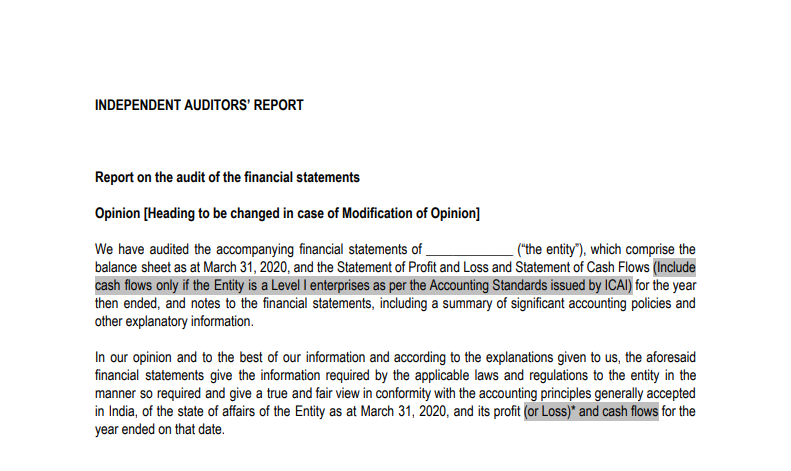NCE – Specimen Audit Report March 2020
- NCE – Specimen Audit Report March 2020
- Report on the audit of the financial statements
- Opinion [Heading to be changed in case of Modification of Opinion]
- The basis for opinion [Heading to be changed in case of Modification of Opinion]
- Material Uncertainty Related to Going Concern (include only is applicable)
- Key audit matters
- Emphasis of Matter
- Other Matters [To be included only if applicable]
- Management’s responsibility for the financial statements
- Auditor’s responsibilities for the audit of the financial statements
- Read the Copy:
NCE – Specimen Audit Report March 2020
INDEPENDENT AUDITORS’ REPORT
Report on the audit of the financial statements
Opinion [Heading to be changed in case of Modification of Opinion]
We have audited the accompanying financial statements of _____________ (“the entity”), which comprise the balance sheet as at March 31, 2020, and the Statement of Profit and Loss and Statement of Cash Flows (Include cash flows only if the Entity is a Level I enterprises as per the Accounting Standards issued by ICAI) for the year then ended, and notes to the financial statements, including a summary of significant accounting policies and other explanatory information.
In our opinion and to the best of our information and according to the explanations given to us, the aforesaid financial statements give the information required by the applicable laws and regulations to the entity in the manner so required and give a true and fair view in conformity with the accounting principles generally accepted in India, of the state of affairs of the Entity as at March 31, 2020, and its profit (or Loss)* and cash flows for the year ended on that date.
The basis for opinion [Heading to be changed in case of Modification of Opinion]
We conducted our audit in accordance with the standards on auditing issued by the Institute of Chartered Accountants of India. Our responsibilities under those standards are further described in the auditor’s responsibilities for the audit of the financial statements section of our report. We are independent of the Entity in accordance with the code of ethics issued by the Institute of Chartered Accountants of India (ICAI) together with the ethical requirements that are relevant to our audit of the financial statements and we have fulfilled our other ethical responsibilities in accordance with these requirements and the code of ethics.
We believe that the audit evidence we have obtained is sufficient and appropriate to provide a basis for our opinion.
Material Uncertainty Related to Going Concern (include only is applicable)
The Entity’s net worth is negative and it continues to incur losses. We were informed that the Entity is in the process of identifying alternative business plans which in the opinion of the management will enable the Entity to have profitability and to have a turnaround. The Entity is also in the process of identifying strategic business partners and alternative business plans to improve the performance of the Entity. The Entity’s ability to generate positive cash flows depends on the successful implementation of such alternative business plans.
The above factors cast a significant uncertainty on the Entity’s ability to continue as a going concern. Pending the resolution of the above uncertainties, the Entity has prepared the aforesaid statement on a going concern basis.
Key audit matters
Key audit matters are those matters that, in our professional judgment, were of most significance in our audit of the financial statements of the current period. These matters were addressed in the context of our audit of the financial statements as a whole, and informing our opinion thereon, and we do not provide a separate opinion on these matters.
Reporting of key audit matters as per SA 701, Key Audit Matters are not applicable to the Entity as it is not a listed company.
Emphasis of Matter
As more specifically explained in Note 2 to the financial statements, the entity has made a detailed assessment of its liquidity position for the next year and the recoverability and carrying value of its assets comprising property, plant, and equipment, investments, inventory and trade receivables. Based on current indicators of future economic conditions, the entity expects to recover the carrying amount of these assets. The entity continues to evaluate them as highly probable considering the orders in hand. The situation is changing rapidly giving rise to inherent uncertainty around the extent and timing of the potential future impact of the COVID-19 pandemic which may be different from that estimated at the date of approval of the financial results. The entity will continue to closely monitor any material changes arising from future economic conditions and impact on its business.
Our opinion is not modified in respect of this matter.
Other Matters [To be included only if applicable]
Further to the continuous spreading of COVID -19 across India, the Indian Government announced a strict 21-day lockdown on March 24, 2020, which was further extended till June 30, 2020, across India to contain the spread of the virus. This has resulted in restrictions on a physical visit to the client locations and the need for carrying out alternative audit procedures as per the Standards on Auditing prescribed by the Institute of Chartered Accountants of India (ICAI).
As a result of the above, the entire audit was carried out based on remote access of the data as provided by the management. This has been carried out based on the advisory on “Specific Considerations while conducting Distance Audit/ Remote Audit/ Online Audit under current Covid-19 situation” issued by the Auditing and Assurance Standards Board of ICAI. We have been represented by the management that the data provided for our audit purposes is correct, complete, reliable, and are directly generated by the accounting system of the entity without any further manual modifications.
We bring to the attention of the users that the audit of the financial statements has been performed in the aforesaid conditions.
Our audit opinion is not modified in respect of the above.
Management’s responsibility for the financial statements
The management is responsible for the preparation of these financial statements that give a true and fair view of the financial position, financial performance and cash flows of the Entity in accordance with the accounting principles generally accepted in India, including the accounting standards specified by ICAI. This responsibility also includes maintenance of adequate accounting records for the safeguarding of the assets of the Entity and for preventing and detecting frauds and other irregularities; selection and application of appropriate accounting policies; making judgments and estimates that are reasonable and prudent; and design, implementation, and maintenance of adequate internal financial controls, that were operating effectively for ensuring the accuracy and completeness of the accounting records, relevant to the preparation and presentation of the financial statement that gives a true and fair view and is free from material misstatement, whether due to fraud or error.
In preparing the financial statements, management is responsible for assessing the Entity’s ability to continue as a going concern, disclosing, as applicable, matters related to going concern and using the going concern basis of accounting unless management either intends to liquidate the entity or to cease operations or has no realistic alternative but to do so.
The management is also responsible for overseeing the Entity’s financial reporting process.
Auditor’s responsibilities for the audit of the financial statements
Our objectives are to obtain reasonable assurance about whether the financial statements as a whole are free from material misstatement, whether due to fraud or error and to issue an auditor’s report that includes our opinion. Reasonable assurance is a high level of assurance but is not a guarantee that an audit conducted in accordance with SAs will always detect a material misstatement when it exists. Misstatements can arise from fraud or error and are considered material if, individually or in the aggregate, they could reasonably be expected to influence the economic decisions of users taken on the basis of these financial statements.
As part of an audit in accordance with SAs, we exercise professional judgment and maintain professional skepticism throughout the audit. We also:
- Identify and assess the risks of material misstatement of the financial statements, whether due to fraud or error, design and perform audit procedures responsive to those risks, and obtain audit evidence that is sufficient and appropriate to provide a basis for our opinion. The risk of not detecting a material misstatement resulting from fraud is higher than for one resulting from error, as fraud may involve collusion, forgery, intentional omissions, misrepresentations, or the override of internal control.
- Obtain an understanding of internal control relevant to the audit in order to design audit procedures that are appropriate in the circumstances.
- Evaluate the appropriateness of accounting policies used and the reasonableness of accounting estimates and related disclosures made by the management.
- Conclude on the appropriateness of management’s use of the going concern basis of accounting and, based on the audit evidence obtained, whether a material uncertainty exists related to events or conditions that may cast significant doubt on the Entity’s ability to continue as a going concern. If we conclude that a material uncertainty exists, we are required to draw attention in our auditor’s report to the related disclosures in the financial statements or, if such disclosures are inadequate, to modify our opinion. Our conclusions are based on the audit evidence obtained up to the date of our auditor’s report. However, future events or conditions may cause the entity to cease to continue as a going concern.
- Evaluate the overall presentation, structure, and content of the financial statements, including the disclosures, and whether the financial statements represent the underlying transactions and events in a manner that achieves fair presentation.
Materiality is the magnitude of misstatements in the financial statements that, individually or in aggregate, makes it probable that the economic decisions of a reasonably knowledgeable user of the financial statements may be influenced. We consider quantitative materiality and qualitative factors in (i) planning the scope of our audit work and in evaluating the results of our work; and (ii) to evaluate the effect of any identified misstatements in the financial statements.
We communicate with those charged with governance regarding, among other matters, the planned scope and timing of the audit and significant audit findings, including any significant deficiencies in internal control that we identify during our audit.
We also provide those charged with governance with a statement that we have complied with relevant ethical requirements regarding independence, and to communicate with them all relationships and other matters that may reasonably be thought to bear on our independence, and where applicable, related safeguards.
For ____________________
Chartered Accountants
Firm Registration No._____________
(____________________)
Partner
Membership No. _________
UDIN :
Place: Chennai
Date: ___, 2020
Read the Copy:
If you already have a premium membership, Sign In.
 ConsultEase Administrator
ConsultEase Administrator
Consultant
Faridabad, India
As a Consultease Administrator, I'm responsible for the smooth administration of our portal. Reach out to me in case you need help.













